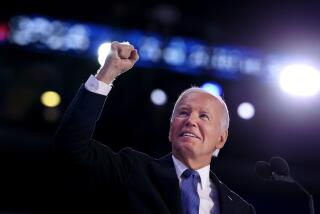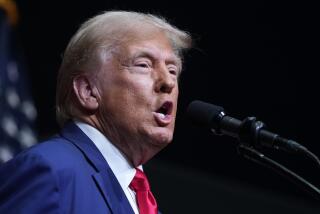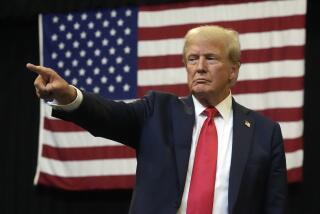Diplomacy Mixes With Partisanship
WASHINGTON — President Bush’s State of the Union address Tuesday night came in two distinct voices.
For much of the 54-minute speech, Bush spoke in the relatively measured tones of a president’s annual report to Congress. But more striking were the flashes of Bush as a combative partisan, in the sharper tones of an election campaign already well underway.
In presidential mode, Bush described himself as he wants voters to see him: resolute in the war on terrorism, devoted to traditional values and compassionate toward the unemployed and uninsured.
In candidate mode, Bush condemned unnamed “critics” who, in his telling, opposed the invasion of Iraq, still question the war on terrorism, seek now to undermine education reforms and hope to undo his tax cuts.
This was an unmistakably election-year State of the Union speech, one relatively light on ambitious new policies or programs but rich in the broad themes the president is expected to use in his reelection bid.
For months, Bush and his aides have professed a desire to postpone their entry into the political debate that Democrats have already launched with gusto in Iowa and New Hampshire. But Tuesday, Bush spoke in barely concealed response to the Democratic candidates on the campaign trail -- and sounded distinctly eager to join the fray.
“We have faced serious challenges together, and now we face a choice,” the president declared. “We can go forward with confidence and resolve, or we can turn back to the dangerous illusion that terrorists are not plotting.... We can press on with economic growth and reforms in education and Medicare, or we can turn back to the old policies and old divisions.”
Bush did not name the opponents who espouse the less palatable of those choices. His Democratic rivals instantly and indignantly rejected the implicit charge that they do not take terrorism seriously and do not care to “press on with economic growth.”
Sen. Joseph R. Biden Jr. (D-Del.), who supported the war in Iraq, said he was infuriated by Bush’s suggestion -- Biden called it “innuendo” -- that some Democrats do not believe that terrorism poses a serious threat. “Whoever said that?” Biden said, fuming. “It’s a straw man.”
House Minority Leader Nancy Pelosi (D-San Francisco), who gave part of the Democrats’ official response to the address, declared that her party shares an “unbending determination to make the world safer for America.”
The president’s message had three parts: He sought to build on his greatest political strength, his image as a leader in the war on terrorism; he reaffirmed his commitment to promote traditional social values, including opposition to gay marriage; and he sought to neutralize the Democrats’ advantage on issues such as unemployment and health care, proposing programs to improve job training for high school students and unemployed workers, and a new tax credit to help low-income families buy health insurance.
“These are relatively small programs, but it’s an effective use of symbols to neutralize his weak spots,” said Norman Ornstein, a political scientist at the American Enterprise Institute, a predominantly conservative think tank. “Bill Clinton used to do that, and it drove Republicans crazy -- because it works.... And it will probably work for Bush.”
Republican strategists have acknowledged that their party’s greatest vulnerability this year is the perception of many voters that Democrats are more devoted to solving the problems of unemployed workers and families without health insurance.
The GOP needs “a domestic agenda people can really taste, and that’s got a real sense of guidance and leadership,” said Sen. Sam Brownback (R-Kan.).
Brownback said Bush has made progress in the war on terrorism and promoting an economic recovery, but that has prompted many voters to ask: “What have you done for me lately?”
An advisor to Bush’s reelection campaign said the president’s proposals on job training and health care followed a pattern he charted with his education reform bill and his program to add prescription drug benefits to Medicare -- stealing the Democrats’ thunder on an issue they thought they owned.
“This president has eliminated the Democrats’ advantage [in the polls] on education, and reduced their advantage on health,” the advisor said. “That is a major political achievement.”
A Washington Post-ABC News poll that was released before Bush spoke found that, by 55% to 37%, most Americans disapprove of the job he has done on providing affordable health insurance. But on both education and the economy, most voters questioned said they approved of Bush’s performance as president. And on issues of national security, the voters endorsed Bush by a wide margin; on terrorism, for example, a solid 66% said they approved of the job he has done.
“Overall, Bush is in a very strong position for a president at this stage of a reelection campaign. But discontent about health care and unemployment has turned up,” said Andrew Kohut, director of the Pew Research Center for the People and the Press. “The proposals he makes in a speech like this won’t solve those problems, but they give voters a general impression that he’s working on them. What he can claim now is that they have made a start.”
Ornstein agreed. “These proposals are to make sure no one can say that Bush is doing nothing at all about these problems,” he said.
The Republicans “have been working their way through a checklist of their political vulnerabilities and trying to eliminate each one.... We know that Bush is not going to turn every voter into a true believer. You don’t have to win everyone over to take away that edge of anger,” he said.
The modest scale of Bush’s proposals made them something of “a gamble,” Ornstein said. “If the economy continues to improve, he’ll be fine. But if the economy doesn’t get better, these may be seen as empty gestures.”
Bush aides and other GOP strategists acknowledged that the growing federal budget deficit -- and the president’s own pledge to restrain growth on government spending -- imposed a severe limit on the size of the programs he could propose.
“There are no $400-billion initiatives in here,” said Sen. Rick Santorum (R-Pa.). “It’s important for the president to focus on problems out there, but I guarantee you this is going to be an austere budget.”
Bush is to present Congress with his fiscal 2005 budget next month.There were some notable omissions in his speech.
Economic conservatives who had hoped for a red-meat promise from Bush to make tax-free retirement savings accounts a centerpiece of his second term had to be content with the political equivalent of consomme: a mild restatement of Bush’s desire to allow younger workers to invest some of their Social Security taxes in individual accounts.
“You want a big thing? There’s a big thing,” Grover Norquist, president of Americans for Tax Reform, a conservative group, said before the speech. “Social Security would be a ‘wow.’ Making tax cuts permanent, that’s not a ‘wow.’ They’ve already announced that.”
Also left out was any mention of the president’s proposal, made only last week, to send astronauts to the moon as the first step of a program to land humans on Mars. Polls have found that many voters are unenthusiastic about spending the money an expanded manned space program would take.
“It’s not real popular,” an administration official said.
*
Times staff writer Janet Hook contributed to this report.
More to Read
Get the L.A. Times Politics newsletter
Deeply reported insights into legislation, politics and policy from Sacramento, Washington and beyond. In your inbox three times per week.
You may occasionally receive promotional content from the Los Angeles Times.











